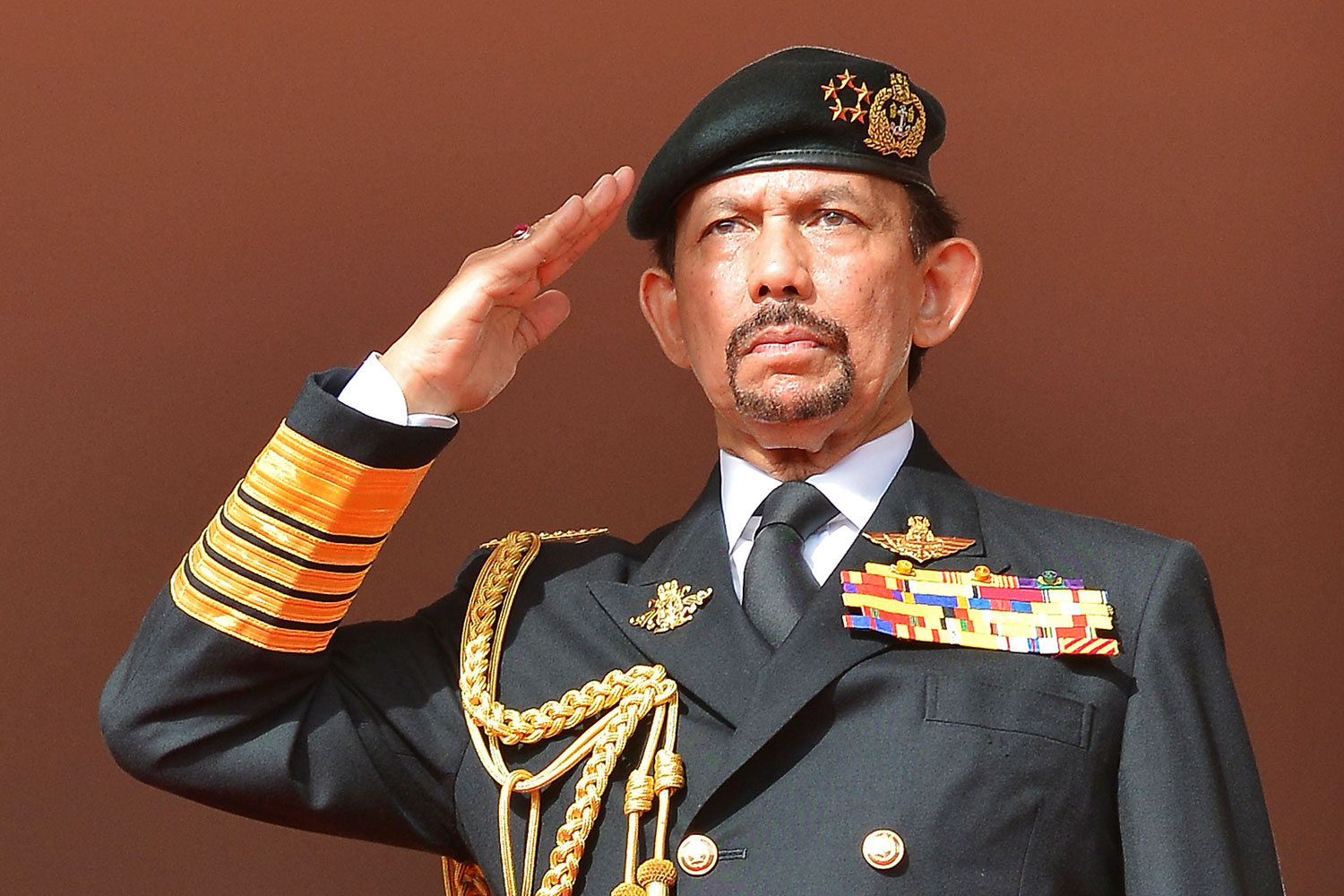
On Thursday, Sultan Hassanal Bolkiah of Brunei responded to international criticism regarding next month’s introduction of Sharia law by claiming “people outside of Brunei should respect us in the same way that we respect them.”
The 67-year-old said that integrating Islamic diktats into the Penal Code would form “part of the great history of our nation” and provide “special guidance” from God. He had earlier warned that subjects who voiced dissent can “no longer be given the liberty to continue with their mockery” and would be charged with slandering the monarch.
In many ways, Brunei is the ultimate paradox. Ranked fifth in the world for per capita GDP — one place above the U.S. — its 400,000-odd population enjoys a human development score a smidgen below Great Britain.
Yet the nation is an autocracy that the Sultan has ruled with absolute authority for half-a-century. There is no popular representation, all media is tightly controlled and a biennial “state of emergency” has been rolling since 1962, despite the conspicuous lack of internal or external threats. Boasting a personal fortune of some $20 billion, Sultan Hassanal lives in a 1,800-room palace but appears to be becoming increasingly spiritual in later life.
According to the provisions of Sharia law, various offenses must be punished with brutal violence, such as death by stoning for adulterers, the severing of limbs for theft and flogging for abortions or homosexual acts.
“Brunei is showing its feudal characteristics as an 18th-century state rather than an important member of a regional Southeast Asian economic and social consensus in the 21st century,” said Phil Robertson, deputy Asia director at Human Rights Watch.
To many, Sharia law in Brunei is yet another example of creeping Islamization of Southeast Asia, but confusion has reigned ever since the news first broke in October. Almost immediately, officials attempted to quell rising rancor by insisting non-Muslims would be exempt. “They can continue to practice their own religions. There is no compulsion in Islam,” Dato’ Seri Syeikh Hj Nooh Gadot, adviser to the Johor Islamic Religious Council, told the Brunei Times. “Their religions and cultures are protected.”
However, Emerlynne Gil, Southeast Asia legal adviser for the International Council of Jurists (ICJ), disagrees. “It is expressly stated in the law that it is applicable to Muslims and non-Muslims except otherwise provided for,” she tells TIME, adding that as the “only provisions provided are for Muslims” there are no alternative rules to govern other faiths. (The ICJ has laid out its concerns in full here.)
Brunei is markedly more conservative than Muslim-majority neighbors Malaysia and Indonesia, but not quite as draconian as Saudi Arabia. Alcohol is forbidden (speakeasy drinking dens are not difficult to find though) as is preaching of religions other than Islam. Women can occupy senior positions in the civil service and business but suffer legal discrimination, including the invalidity of spousal rape.
And as no opposition movement is permitted in Brunei — the national legislature of “consultants” is handpicked and only meets once a year — accurately gauging support for Sharia law is nigh impossible. No independent NGOs exist in Brunei and self-censorship pervades. Even so, “there is a lot of criticism from the local population but only through social media,” says Gil.
Brunei was already struggling to walk the tightrope between authoritarianism and progress. Last year, noted Burmese scholar Maung Zarni resigned from his post at Darussalam Brunei University after he was instructed to stop extolling the merits of democracy in his homeland.
“I simply could not countenance allowing my employer to intimidate me into professional silence on unfolding human rights atrocities,” he wrote in his resignation letter. Ironically, it was highlighting the persecution of Burma’s Rohingya Muslim minority at the hands of his fellow Buddhists that got the academic into hot water.
According to prominent female Islamic scholar Professor Najibah Mohd Zin, Brunei is better placed that other states to successfully implement Sharia law because of its relative wealth and development. Nevertheless, “investigation must be very, very thorough,” she cautions. “You cannot simply tell a pregnant unmarried woman that she’s guilty of adultery.”
More Must-Reads From TIME
- The 100 Most Influential People of 2024
- Coco Gauff Is Playing for Herself Now
- Scenes From Pro-Palestinian Encampments Across U.S. Universities
- 6 Compliments That Land Every Time
- If You're Dating Right Now , You're Brave: Column
- The AI That Could Heal a Divided Internet
- Fallout Is a Brilliant Model for the Future of Video Game Adaptations
- Want Weekly Recs on What to Watch, Read, and More? Sign Up for Worth Your Time
Write to Charlie Campbell at charlie.campbell@time.com